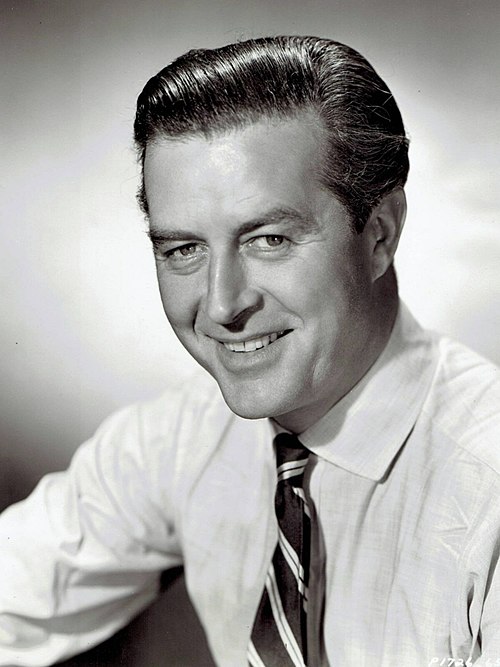
Ray Milland
Description
Ray Milland (born Alfred Reginald Jones; 3 January 1907 – 10 March 1986) was a Welsh-American actor and film director. He is often remembered for his portrayal of an alcoholic writer in Billy Wilder's The Lost Weekend (1945), which won him Best Actor at Cannes, a Golden Globe Award, and ultimately an Academy Award—the first such accolades for any Welsh actor.
Before becoming an actor, Milland served in the Household Cavalry of the British Army, becoming a proficient marksman, horseman and aeroplane pilot. He left the army to pursue a career in acting and appeared as an extra in several British productions before getting his first major role in The Flying Scotsman (1929). This led to a nine-month contract with MGM, and he moved to the United States, where he worked as a stock actor. After his MGM contract ended, Milland was picked up by Paramount, which used him in a range of lesser speaking parts, usually as an English character. He was lent to Universal for the Deanna Durbin musical Three Smart Girls (1936), and its success led to Milland's playing the lead role in The Jungle Princess (also 1936) alongside new starlet Dorothy Lamour. The film was quite successful and raised both to stardom. Milland remained with Paramount for almost 20 years.
Milland appeared in many other notable films, including Easy Living (1937), Beau Geste (1939), Billy Wilder's The Major and the Minor (1942), opposite a corrupt John Wayne in Reap the Wild Wind (1942), The Uninvited (1944), Fritz Lang's Ministry of Fear (1944), The Big Clock (1948), and The Thief (1952)—for which he was nominated for his second Golden Globe. Two standout films later in his career include Alfred Hitchcock's Dial M for Murder (1954) and Love Story (1970). After leaving Paramount, he began directing and moved into television acting. Once Paramount Pictures' highest-paid actor, Milland co-starred alongside many of the most popular actresses of the time, including Gene Tierney, Jean Arthur, Grace Kelly, Lana Turner, Marlene Dietrich, Maureen O'Hara, Ginger Rogers, Jane Wyman, Loretta Young, and Veronica Lake.
Milland was born Alfred Reginald Jones on 3 January 1907 in Neath, Wales, the son of Elizabeth Annie (née Truscott) and steel mill superintendent Alfred Jones. He was schooled independently before attending King's College School public school in Cardiff. He also worked at his uncle's horse-breeding farm before leaving home at the age of 21. Of his parents, he wrote in his 1974 autobiography:
Prior to becoming an actor, Milland served in the Royal Horse Guards of the Household Cavalry, in 1925. An expert shot, he became a member of his squadron’s rifle team, winning many prestigious competitions, including the Bisley Match in England. He won the British Army Championship in both pistol and rifle marksmanship.
While stationed in London, Milland met dancer Margot St. Leger, and through her was introduced to American actress Estelle Brody. Brody queried Milland's commitment to an army career, which led him into buying himself out of the forces in 1928 with the hope of becoming an actor. (According to one account, he was able to support himself with a £17,000 inheritance from his aunt. Another said he was forced to drop out when his father refused to continue subsidising him.)
His first appearance on film was as an uncredited extra on the E.A. Dupont film Piccadilly (1929). After some unproductive extra work, which never reached the screen, he signed with a talent agent named Frank Zeitlin on the recommendation of fellow actor Jack Raine.
His prowess as a marksman earned him work as an extra at the British International Pictures studio in Arthur Robison's production of The Informer (1929), the first screen version of the Liam O'Flaherty novel. While he was working on The Informer, he was asked to test for a production being shot on a neighbouring stage. Milland made a favourable impression on director Castleton Knight, and was hired for his first acting role as Jim Edwards in The Flying Scotsman (also 1929). In his autobiography, Milland recalls that on this film set, it was suggested that he adopt a stage name; he chose Milland from the "mill lands" area of his Welsh hometown of Neath.
His work on The Flying Scotsman resulted in him being granted a six-month contract over the course of which Milland starred in two more Knight-directed films, The Lady from the Sea and The Plaything (both 1929). Believing that his acting was poor, and that he had won his film roles through his looks alone, Milland decided to gain some stage experience to improve his ability. After hearing that club owner Bobby Page was financing a touring company, Milland approached him in hopes of work. He was given the role of second lead in a production of Sam Shipman and Max Marcin's The Woman in Room 13. Despite being released from the play after five weeks, Milland felt that he had gained valuable acting experience.
In between plays, Milland was approached by MGM vice-president Robert Rubin, who had seen the film The Flying Scotsman. MGM offered Milland a nine-month contract at $175 a week, based in Hollywood. He accepted, leaving the United Kingdom in August 1930. MGM used Milland as a 'stock' player, selecting him for small speaking parts in mainstream productions.
Milland's first experience in making a Hollywood film resulted in a humiliating scene on the set of Son of India (1931), when the film's director Jacques Feyder berated Milland's acting in front of the entire crew. Despite this setback, the studio executives talked Milland into staying in Hollywood, and in 1930, he appeared in his first US film Passion Flower. Over the next two years, Milland appeared in minor parts for MGM and a few films for which he was lent to Warner Bros; he was often uncredited. His largest role during this period was as Charles Laughton's nephew in Payment Deferred (1932).
While in this first period working in the United States, Milland met Muriel Frances Weber, whom he always called "Mal", a student at the University of Southern California. Within eight months of first meeting, the two were married. The ceremony took place on 30 September 1932 at the Riverside Mission Inn. The couple had a son, Daniel, and adopted a daughter, Victoria.
Shortly after making Payment Deferred, Milland found himself out of work when MGM failed to renew his contract. He spent five months in the US attempting to find further acting work, but after little success and a strained relationship with his father-in-law he decided to head back to Britain, hoping that two years spent in Hollywood would lead to roles in British films. Milland cashed in his contracted first-class return ticket to Britain and found an alternative, cheaper way back home. Muriel remained in the States to finish her studies, and Milland found temporary accommodation in Earl's Court in London.
Milland found life in Britain difficult, receiving little regular work, although he finally found parts in two British films, This Is the Life and Orders Is Orders (both 1933). Neither was a breakthrough role.
Then, in 1933, Roosevelt's reforms to the U.S. banking sector led to a temporary weakness in the dollar, allowing Milland to afford a return to the United States. He returned to California, and found a small flat on Sunset Boulevard, promising Muriel that he would buy a home once he was financially stable.
With little prospect of finding acting work, Milland took on menial jobs, including working for a bookie. He decided to find regular employment and through connections made during his time in the UK, he was offered the job of assistant manager of a Shell gas station on Sunset and Clark.
On his return from his successful Shell interview, he passed by the gates of Paramount Pictures, where he was approached by casting director Joe Egli. Paramount was filming the George Raft picture Bolero (released in February 1934), but an injury to another British actor had left the studio looking for an urgent replacement. Egli offered Milland a two-week contract, at ten times the salary the assistant job would pay. Milland took the acting role.
After completing Bolero, Milland was offered a five-week guarantee by Benjamin Glazer to work on an upcoming screwball comedy starring Bing Crosby and Carole Lombard entitled We're Not Dressing (also 1934). During filming, he appeared in a scene with George Burns and Gracie Allen, which Milland recalls as falling into an "ad-libbed shambles" that he felt was better than the original script. The film's director Norman Taurog was so impressed, he rang the chief production executive and suggested that Milland be placed on a long-term contract. After a short meeting, Milland was offered a seven-year deal with Paramount starting at $175 a week. The contract gave Milland a secure income, and Muriel and he moved into an apartment on Fountain Avenue.
Milland later said "It all happened by luck and I was just there at the right place at the right time."
During his first contract with Paramount, Milland was used as part of the speaking cast, but never as a top-of-the-bill actor. He had a supporting role, for instance, in the original The Glass Key (1935) with George Raft.
Milland was lent to Universal for Next Time We Love (1936), with Margaret Sullavan and James Stewart. Back at Paramount he was in The Return of Sophie Lang (1936) and The Big Broadcast of 1937 (1936).
He was contacted by Joe Pasternak, who was looking for an 'English' actor for the lead in his new picture, Three Smart Girls (1936). Although Pasternak worked for Universal Studios, Paramount had agreed to lend Milland out for the film.
On returning to Paramount after Three Smart Girls was wrapped, Milland was used as a test actor to find a new starlet for The Jungle Princess (1936). When the studio chose Dorothy Lamour for the lead, Milland wrote in his autobiography that Lamour was confused to find that he was not to be her male lead and she requested Milland to be her co-star. Paramount was not keen, but when Three Smart Girls was pre-released to rave reviews, they gave Milland the role. By the end of 1936, Milland was being considered for leading roles, and Paramount rewrote his contract, resulting in the tripling of his salary.
Thanks to Wikipedia for this content
 Thanks to Yarik
for the idea of this Favorite
April 01, 2025
Thanks to Yarik
for the idea of this Favorite
April 01, 2025
 Fuser
Fuser
 Hiroshi
Hiroshi
 NARYTHY86368NEYHRTGE
NARYTHY86368NEYHRTGE
 Nadiya
Nadiya
 Yarik
Yarik
 Siobhán Murphy
Siobhán Murphy
 Nguyen Van An
Nguyen Van An
 Jakub Nowak
Jakub Nowak
 Liam
Liam
 Sarah Wilson
Sarah Wilson
 Freja Lindström
Freja Lindström
 Ingrid
Ingrid
 Jane Smith
Jane Smith
 Michael Brown
Michael Brown
 James С
James С
 Hugo van Dijk
Hugo van Dijk
 Sven
Sven
 NARYTHY822652NERTHRTYHR
NARYTHY822652NERTHRTYHR
 Luca Rossi
Luca Rossi
 Daniel Martinez
Daniel Martinez